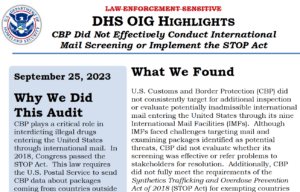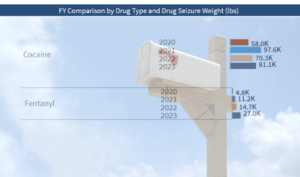The millions of small packages arriving every day at U.S. ports are presenting U.S. Customs and Border Protection (CBP) agents with an impossible mandate that is also increasingly threatening to their personal health and wellbeing. These were the findings of two recent Homeland Security Office of Inspector General (OIG) reports, both examining CBP’s implementation of legislation related to fentanyl shipments through the mail.
The bigger report, titled “CBP Did Not Effectively Conduct International Mail Screening or Implement the STOP Act”, was published on Sept. 25. It noted that CBP faced serious shortfalls in its mail screen duties given to it by Congress. “CBP did not consistently target for additional inspection or evaluate potentially inadmissible international mail entering the United States through its eight International Mail Facilities (IMFs).” the report led. IMFs are facilities run where international mail is received.
 In 2010, about two thousand small packages arrived each day claiming de minimis treatment. That number is now well above two million per day. While CBP can conceivably inspect two thousand per day, two-to-three million per day is impossible. Congress is still digesting this point.
In 2010, about two thousand small packages arrived each day claiming de minimis treatment. That number is now well above two million per day. While CBP can conceivably inspect two thousand per day, two-to-three million per day is impossible. Congress is still digesting this point.
Back in 2018, when the issue of fentanyl sellers in China selling to the United States via the mail came to a head in Congress, the legislature reacted by passing the Synthetics Trafficking & Overdose Prevention (STOP) Act. The idea here was that we could get a handle on the fentanyl issue if only we had “Advance Electronic Data” for mail coming from overseas. This would help CBP become some sort of super detective, and intercept all the drugs. China actually complied: Advance Electronic Data is now included on virtually 100% of mail sent from China Post to the U.S. Postal Service. The new OIG report however makes plain that the mission Congress gave CBP was always a fool’s errand.
You can no more police 2-3 million small package shipments per day than you can police mosquitoes for malaria.
Despite the challenges in policing the mail, drugs are still being caught. As of September, Customs seized a record 27,022 pounds of fentanyl that was shipped to the U.S. via small packages. That is up from 14,700 pounds the Jan-Sept period of 2022 and more than five-times the amount seized by Customs over the same period in 2020. Cocaine was the only other drug out of a list of 9 common drugs seized by the CBP that showed an increase in 2023 over 2022 levels.
Keeping CBP Officers Safe
Fentanyl and other synthetic opioids pose potentially lethal dangers to law enforcement personnel who may be unknowingly exposed to fentanyl while screening small package imports. It only takes 2 milligrams of fentanyl to kill most individuals. In CBP’s FY2022, six CBP personnel stationed at ports had to be administered naloxone after being exposed to fentanyl or a similar opioid while on duty.
A second OIG report from August, “CBP’s Management of International Mail Facilities Puts Officer Safety and Mission Requirements at Risk”, had more alarming revelations about CBP’s ability to police the mail. The report found that “CBP did not ensure prompt resolution of serious issues, including critical maintenance and life safety deficiencies, at six IMFs. Additionally, CBP paid for unusable space at two IMFs. Finally, the San Juan IMF had a lapsed space agreement and operated out of temporary, jerry-rigged locations for more than 6 years, including a period of time when it operated out of a parking lot.
 CBP officers and agents seize, test, transport, store, and destroy illegal drugs, including synthetic opioids like fentanyl. CBP also uses canine enforcement teams as an integral part of its drug enforcement strategy to detect illegal drugs. CBP’s daily operations include inspecting cargo containers as well as international mail at 8 facilities, including one in Puerto Rico and one in Saint Thomas in the U.S. Virgin Islands. The latter were flagged in a report for not following protocol for mail screening.
CBP officers and agents seize, test, transport, store, and destroy illegal drugs, including synthetic opioids like fentanyl. CBP also uses canine enforcement teams as an integral part of its drug enforcement strategy to detect illegal drugs. CBP’s daily operations include inspecting cargo containers as well as international mail at 8 facilities, including one in Puerto Rico and one in Saint Thomas in the U.S. Virgin Islands. The latter were flagged in a report for not following protocol for mail screening.
Customs data shows that CBP agents are tasked with piling through more than a billion individual packages this year as of September, nearly two times 2019 levels of small packages.
Companies have increased their lobbying efforts in Washington in recent weeks around the issue of the de minimis import rule that makes it easy to ship small packages to the U.S. Chinese e-commerce companies are lobbying Washington to attack anyone who advocates for changes to these policies, policies which are essential to further building out the direct-from-China e-commerce model.
Online clothing retailer Shein has reportedly spent upwards of $1 million on the issue since 2022 and is hiring Western executives to help it navigate criticism. Earlier this month, Shein contracted Frances Townsend, a former Activision Blizzard executive who worked for President George W. Bush’s White House and the Justice Department, for a six-month consulting contract as a senior adviser. If she is hired full-time once the contract expires, she will be essential to Shein’s ability to understand the political machinations of Washington, the Wall Street Journal reported about the Sequoia Capital portfolio company.
Shein, its competitor Temu, along with American brands like Nike, have all been served letters by members of the Senate this year inquiring about their China-based direct sales to U.S. The main issue behind the letter was whether these apparel giants were using banned cotton from the Xinjiang province to make goods sold here. Goods made from banned cotton are subject to seizure, but if capturing the rare shipment of drugs is hard, imagine rifling through millions of packages of clothing items coming from abroad and trying to discover if the manufactured goods are part of a banned Xinjiang supply chain?
U.S. laws on customs, product & food safety, and de minimis duty exemptions never contemplated such a huge volume of small package imports. Nearly all of this trade is driven by online purchases which did not exist at this capacity when the laws were written. Small package imports were never a material avenue of commerce. Importing wholesale is an ancient profession, says Charles Benoit, CPA trade counsel. Producers sell to merchants. Merchants buy and import in bulk, then sell their goods to distributors or do it themselves. Distributors sell to retailers like Walmart. Mail-order catalogs have been around since the 19th century, and consumers appreciate ‘factory-direct’ savings, but never before in history have those attempts to cut out the middlemen crossed international borders. E-commerce has facilitated the massive volume increase of small packages and many in the government believe that the CBP is ill-equipped to handle the onslaught. The flow of small packages into the U.S. could be capped, or slowed, with reforms to the de minimis rule.
Rana Foroohar of the Financial Times wrote on Monday that the CBP was “not yet up to the task” in making sure that laws like the Uyghur Forced Labor Law aren’t broken in incoming shipments.
Shein and Temu are all over digital advertising platforms ahead of the American holiday season. Most of their goods come directly from China. However, as Foroohar notes in her article, this translates into ad revenue for the likes of Twitter, Google, and Facebook. The research firm MoffettNathanson has estimated that about a third of Meta’s revenue growth in the 9 months leading up to September came from Shein and Temu alone, making Silicon Valley an ally against any reforms of the de minimis import rule.
On the drug front, CBP has managed to hold down the fort. They seized 1.1 million pounds of narcotics in the Jan-Sept period 2020 and 549,238 lbs so far this year ending in September. It is unclear what has escaped CBP’s purview, of course.
The Inspector General’s Office recommended the CBP take five actions to improve screening. The CBP agreed with all but one measure, which was related to performance metrics of agents.
International mail is nowhere near the main source of fentanyl in the United States, but for CBP agents, uncovering the drug can be lethal if agents are unknowingly exposed to it. It only takes two milligrams of fentanyl to kill most individuals, according to the Inspector’s report.
Small Package Shipment Imports Don’t Work: Evidence Pours In













